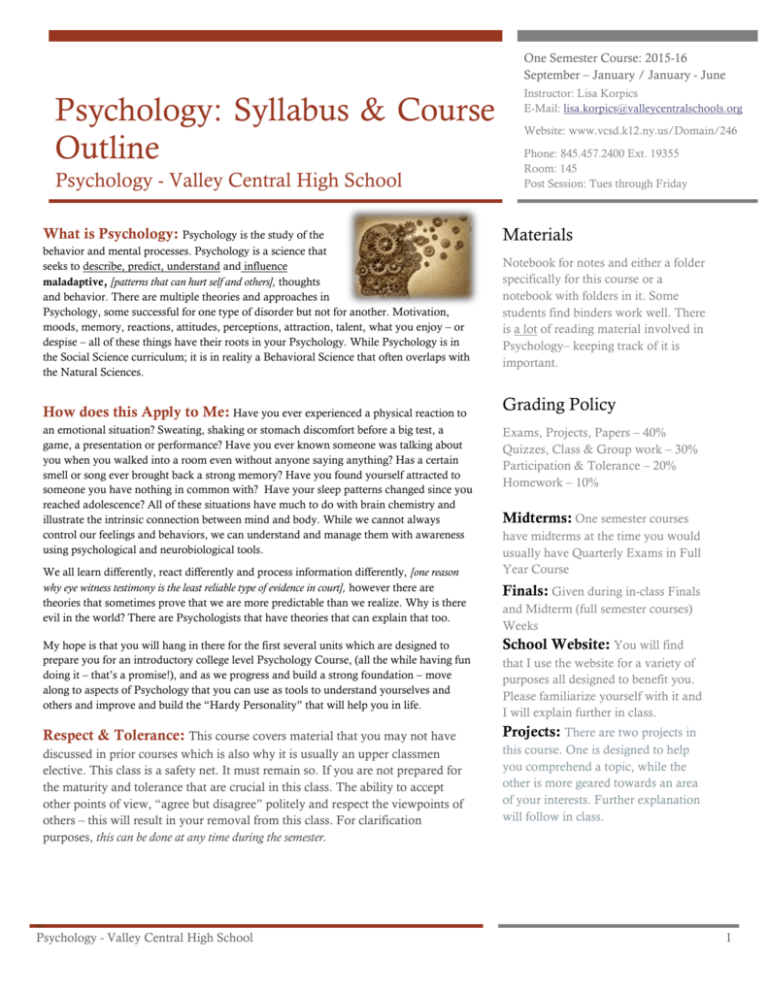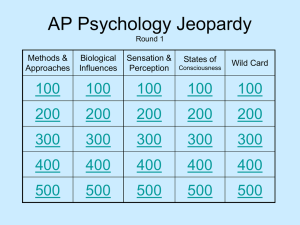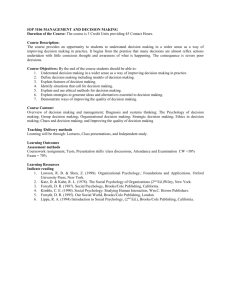Psychology: Syllabus & Course Outline
advertisement

One Semester Course: 2015-16 September – January / January - June Psychology: Syllabus & Course Outline Psychology - Valley Central High School Instructor: Lisa Korpics E-Mail: lisa.korpics@valleycentralschools.org Website: www.vcsd.k12.ny.us/Domain/246 Phone: 845.457.2400 Ext. 19355 Room: 145 Post Session: Tues through Friday What is Psychology: Psychology is the study of the Materials behavior and mental processes. Psychology is a science that seeks to describe, predict, understand and influence maladaptive, [patterns that can hurt self and others], thoughts and behavior. There are multiple theories and approaches in Psychology, some successful for one type of disorder but not for another. Motivation, moods, memory, reactions, attitudes, perceptions, attraction, talent, what you enjoy – or despise – all of these things have their roots in your Psychology. While Psychology is in the Social Science curriculum; it is in reality a Behavioral Science that often overlaps with the Natural Sciences. Notebook for notes and either a folder specifically for this course or a notebook with folders in it. Some students find binders work well. There is a lot of reading material involved in Psychology– keeping track of it is important. How does this Apply to Me: Have you ever experienced a physical reaction to an emotional situation? Sweating, shaking or stomach discomfort before a big test, a game, a presentation or performance? Have you ever known someone was talking about you when you walked into a room even without anyone saying anything? Has a certain smell or song ever brought back a strong memory? Have you found yourself attracted to someone you have nothing in common with? Have your sleep patterns changed since you reached adolescence? All of these situations have much to do with brain chemistry and illustrate the intrinsic connection between mind and body. While we cannot always control our feelings and behaviors, we can understand and manage them with awareness using psychological and neurobiological tools. We all learn differently, react differently and process information differently, [one reason why eye witness testimony is the least reliable type of evidence in court], however there are theories that sometimes prove that we are more predictable than we realize. Why is there evil in the world? There are Psychologists that have theories that can explain that too. Grading Policy Exams, Projects, Papers – 40% Quizzes, Class & Group work – 30% Participation & Tolerance – 20% Homework – 10% Midterms: One semester courses have midterms at the time you would usually have Quarterly Exams in Full Year Course Finals: Given during in-class Finals and Midterm (full semester courses) Weeks My hope is that you will hang in there for the first several units which are designed to prepare you for an introductory college level Psychology Course, (all the while having fun doing it – that’s a promise!), and as we progress and build a strong foundation – move along to aspects of Psychology that you can use as tools to understand yourselves and others and improve and build the “Hardy Personality” that will help you in life. School Website: You will find Respect & Tolerance: This course covers material that you may not have Projects: There are two projects in discussed in prior courses which is also why it is usually an upper classmen elective. This class is a safety net. It must remain so. If you are not prepared for the maturity and tolerance that are crucial in this class. The ability to accept other points of view, “agree but disagree” politely and respect the viewpoints of others – this will result in your removal from this class. For clarification purposes, this can be done at any time during the semester. that I use the website for a variety of purposes all designed to benefit you. Please familiarize yourself with it and I will explain further in class. this course. One is designed to help you comprehend a topic, while the other is more geared towards an area of your interests. Further explanation will follow in class. Psych Psychology - Valley Central High School 1 Expectations -Be on time. I am aware the hallways are crowded and that some of you travel from one end of the building to the other, however I can also check this fact for myself on my attendance program. Please do not take advantage of this. Constant unexcused tardiness will impact your participation grade. -Do not wait for me to tell you to take out your notebooks, or start the Do Now. It wastes valuable time. Do not write on my brand new desks! I’ve waited 16 years for them and it is not in your best interest to ruin them. Tru st me on this. -Cellphones: unless we are doing an activity that involves the use of a cellphone (which does happen on occasion), please keep them on silent and out of sight. If you are looking into your purse or under your desk, or in your book and you are glowing - I will not assume you are experiencing some type of internal illumination. It is from the light of your phone – that is not out of sight. Best is off your desk entirely. I don’t think we need to waste time in an upper level course on cellphones. The policy is clear in your student handbook. -Bathrooms/water fountain. We are fortunate that Room 145 is right next to each of these. Therefore, if you need to use them please do so as quickly as you can –– but try to do this before class begins or during the last few minutes unless it is an emergency. If you vanish for too long or are found somewhere in the building, this will no longer be a privilege for you individually for the rest of the semester. One strike rule. - Absences. If you miss notes, readings, articles, etc. you can find them on my website. If you miss a test or a quiz I can arrange for you to take it online. Please see me with any questions you may have about absences. Since this is a onesemester course, after 5 unexcused absences you can be given no credit. Remember that your graduation depends on a certain amount of credits. Don’t let this half-credit class keep you from graduation. You can refer to your handbook for school policy on absences. -Be respectful; of your classmates and me. You will find that I can be your strongest advocate, but as your teacher I have a job to do that will benefit you in college and in life. If you disrupt the class and waste time, this is not respectful to any of us – even yourself. -Ask. If there is something wrong that is interfering with your ability to meet your requirements in this course, please see me. I can’t help you if you don’t let me know. Closing Thoughts: Is it my hope that you will be able to take away more than a half credit from this course. Past students have been exempted out of Introductory College Classes in some colleges and have successfully taken the CLEP Exam in Psychology and gained as much as 6 college credits. Outside of the academic component, it is my hope that you will gain an understanding of yourselves in ways that will prove to help you understand the behavior and thoughts of yourself and others - and help you to realize that you are never alone. Psych Psychology - Valley Central High School 2 Course Outline: Introduction to Early Psychology & Psychologists: Goals of Psychology (DPUI), describe, predict, understand and influence maladaptive behavior. Wundt, Titchener, James, Empathy, Structural vs. Functionalism, Kohlberg, Stream of Consciousness, Introspection (pros/cons) and longevity of early practices. Approaches to Psychology: Humanistic, Bio-psychological (Neurobiological), Neuroplasticity, Behaviorism, Cognitive, Sociocultural, (World of Jenks: Chad), Psychoanalytic, Freud’s Psychoanalytic Theory, ID Ego Super Ego, Rogers, Maslow, Gardner, Pavlov, Watson, Raynor, Skinner, Harlow, Behavior Modification Project. Classical and Operant Condition, ratios of enforcement, Maslow’s Hierarchy of Needs, Erikson’s Psychosocial stages, Bobo Doll experiment, Root causes of maladaptive behavior as categorized by theory/Approaches to manage maladaptive behavior as categorized by theory. Activity: Here is your first celebrity patient – diagnose and solve with approach possibilities – PRESENTATIONS. Research Methods & Ethics/Treatment of the Developmentally Disabled: APA Standards to Psychological Experimentation (1971), Ethics, Zimbardo and Milgram Experiments, Harry Harlow Rhesus Monkey Experiments and Attachment theory, (20/20 A Man and His Goose and Imprinting – true love), Conrad Lorenz, Zimbardo’s stairway to evil (TED) Why Good People Do Bad Things. Independent variable, dependent variable, experimental group, control group, control, population, survey, random sample, representative sample, double blind study, placebo, case study, longitudinal study, cross sectional study, field study, naturalistic observation, mean, median, mode, correlation, cause, informed consent, lab study (pros/cons of each study). Unethical treatment of the developmentally disabled: “Willowbrook – 25 Years Later”. Capstone Writing Activity Neurobiology: Cerebral Cortex, midbrain, upper brain, reptilian brain, lower brain, brain stem, limbic system, cerebrum, cerebral spinal fluid, blood brain barrier, neurons (motor, sensory and inter), CNS and PNS and parasympathetic and autonomic NS, cerebellum, corpus callosum ( Ed’s Split Brain Surgery – neuroplasticity), Phineas Gage, (My Lobotomy © Ed Dully 2003), sensory cortex, motor cortex, parietal lobe, temporal lobe, medulla oblongata, amygdala, frontal lobe, occipital lobe, optic nerve, right/left brain dominance theory, Broca’s area, Wernicke’s area, hippocampus, thalamus, pons, hypothalamus, RAS, reflexes vs reactions, (DPT, Moro, Cohen, Fencer, Babinski (child vs adult), myelin, axons, dendrites, spinal cord (injuries/para/quadra/plegia), neurotransmitters, soma, multiple sclerosis, Huntington’s disease, A.L.S., Parkinson’s Disease, Encephalitis Lethargica and connection to Streptococcus Auto Immune Reactions, adrenalin, fight/flight, Chronic Encephalopathy (frequent concussion syndrome – professional and school sports), endorphins, GABA, dopamine, serotonin, acetylcholine, neurotransmitters, University of Utah Genetics Dept: “role of endocrine system, dominant and recessive traits, MRI, PET, CAT scans. Dr. Oliver Sacks, Film: Awakenings © 1996 MIDTERM EXAM. Psych Psychology - Valley Central High School 3 Sensory Adaptation, Attention & Gestalt: Detection thresholds, discrimination thresholds, absolute thresholds, signal detection theory, just noticeable difference, subliminal perception. Adaptation, habituation, dis-habituation, attention, selective, filter, divided, multitasking, ADD, ADHD, Vanderbilt Assessment, bottom up processing, top down processing, visual perception, relative size, visual cliff, Gestalt approach and optical illusions. States of Consciousness, Sleep, Dreaming & Psychoactive Substances: unconsciousness, coma, Glasgow Coma Scale, DSMV-VI, Freudian Slips, repression, amnesia (anterograde/retrograde), dissociative fugue states, melatonin, hallucinations, circadian rhythm, stages 1-4, REM, NREM, sleep spindles (2), hypnogogic reflex (1), Somnambulism (3), Enuresis, (3), Sleep talking (2), deprivation, needs of adolescence, ages/changes, healthy sleep tips, sleep study and experiment (pajamas, sleeping bag and pillows invited!), nightmares, dreams, (types) dream theories: Freudian/Jungian, Activation Synthesis Model, Lucid, ESP?, REM Rebound, circadian system symptoms – role in Bipolar Disorder and sleep as a therapeutic approach, ways to maximize healthy sleep, sleep diaries, night terrors, SIDS (sudden infant death syndrome), hypnosis (neodissociative theory, hidden observer theory, posthypnotic suggestion theory), psychoactive drug effects: depressants, stimulants, barbiturates, tranquilizers narcotics, aspiration during alcohol poisoning and death.(University of Utah Genetics Dept: “Mouse Party” interactive cartoon simulation of how your brain responds to drugs. Use of sleep aide – avoiding over use. Overdose: how it happens. Cognition, Learning & Memory: short/long/flashbulb/sensory/iconic/semantic/episodic/state dependent/working memory. Learning: styles: auditory/visual/spatial/kinesthetic/ logical/photographic/shaping/stages/ Piaget’s Development of Children’s Learning, Pre/Concrete/Formal Operational, learned helplessness, testing, Creativity and Innovation - *The famous Box of Creativity”. Google’s test questions – not about computers!, divergent vs. convergent thinkers. Emotional Intelligence: “The Handshake Game”, Testing and education in the US and Elsewhere, The unified test we will ALL create, and ALL fail – yet we are all experts! Defense Mechanisms, Stress & Coping: Online Personality Tests based on Meyers Briggs and the Big 5, self efficacy, trait, archetype, regression, denial, sublimation, suppression, Munchausen’s by Proxy, internal/external locus of control, compensation, rationalization, projection, displacement, passive aggression. Grief and grieving, Post Traumatic Stress Disorder PTSD. Film: “Reign Over Me.” © 2006. Abnormal Psychology: Developmental, Psychological & Personality Disorders abnormal behavior, DSM-IV-TR (adults and children), Scales for severity, anxiety, panic disorder, GAD, OCD, PTSD, phobias, conversion disorders, somatoform disorders, hypochondriasis, and (social media-chondria), clinical depression, bipolar disorder I and II and ONC ) otherwise not categorized, seasonal affective disorder, Schizophrenia (disorganized, catatonic, paranoid, undifferentiated), causes?, 20/20 Childhood Schizophrenia & 20/20 Interactive “Inside the Mind of a Schizophrenic” simulation., personality disorders: paranoid, dependent, narcissistic, antisocial, histrionic, dissociative identify disorder, Soci/Psychopathy (The Sociopath Next Door © Martha Stout) , Dr. Robert Hare’s Psychopathy Scale, autism, Asperger’s disorder, treatment modalities: psychopharmacology, antipsychotics, antidepressants, MAO inhibitors, SSRI’s, lithium Benzodiazepines, types of therapy. REVIEW & FINAL PROJECT: Due FINAL EXAM Psych Psychology - Valley Central High School 4 Psych Psychology - Valley Central High School 5







